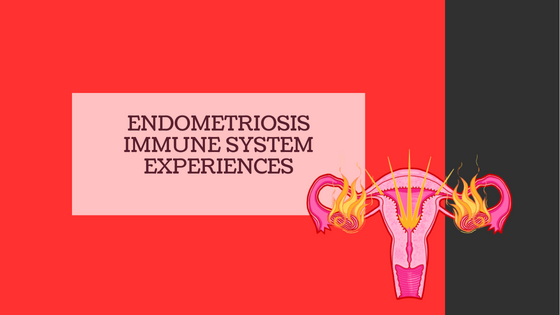This text was first pubished in German language on 25th February.
I would like to make my experiences and thoughs available on a broader range, so I decided to create an English version too.
Endometriosis - we should talk more open about it
For a long time a blog post about the chronic disease 'endometriosis' has been waiting on my list. I was diagnosed back in 2009. Writing it like this sends a cold shiver down my spine. For 14 years now, the disease has accompanied me in full awareness.
More...
Since 2020, I have been diving deeper and deeper into the exploration of endometriosis, primarily from a naturopathic perspective. I am looking deeper into potential causes and epigenetic and traumatic influencing factors.
But before I go into more detail, it is important for me to shed some light on the timing of the publication. In the last few weeks, endometriosis has - again - become a bit more present for me, especially due to my annual check-up with my gynecologist. In regards to the desire to have children, a confrontation with this aspect is also inevitable and thus a profound monologue with myself was set on the agenda.
And while the struggle became more and more painful and difficult, a wonderful blog post crossed my way. Through the Fediverse, I became aware of Anne's recently published blog post about 'Endo' (as I affectionately call it). Absolutely worth reading and my final nudge towards writing my own blog post and sharing my experiences with the world.
We should talk more about it...
Endometriosis - what is it exactly?
Since there are so many definitions to the appearance and clinical picture of endometriosis, I decided to ask chatGPT for its individual definition. My first question though, with subsequent refinement. The result: a definition in five sentences.
"Endometriosis is a chronic disease in women characterized by the growth of tissue outside the uterine cavity. This tissue resembles the lining of the uterus and can settle in the pelvic area, ovaries or other organs. The condition often causes pain, inflammation, and adhesions that can lead to impaired quality of life. In addition, endometriosis can also lead to infertility because it can affect the fallopian tubes and ovaries. Diagnosis often requires surgery to remove the tissue, and treatment usually includes pain medication, hormone therapy or, in severe cases, hysterectomy."
Endometriosis - my medical history
Since too much body text tends to be tiring, i have summarized my course of illness in bullet points.
Since I have a relatively severe form of endometriosis, discontinuation of the birth control pill is risky every time and is therefore closely monitored by my gynecologist to diagnose possible new foci as soon as possible. Since the need for a stoma accompanied me as a risk when when I had surgery in 2014, a deep fear towards potential consequences of the sickness has manifested itself. On the other side, I am also nourished by a deep desire for 'hormone freedom' (in specific: not having to take any pills anymore), which is why I tried another discontinuation in 2020.
Endometriosis - Acceptance & Letting Go
There have been three milestones on the way that have helped me to better deal with the disease. To understand it better, to accept it more honestly and to integrate it as a part of myself and to oppose it with natural means.
An alternative Approach
Christiane Northrup's book "Women's Bodies, Women's Wisdom: The Complete Guide to Women's Health and Wellbeing" fundamentally changed my perspective on endometriosis. I understood that the causes most likely go deeper than pure physical disposition or having drawn a blank in the lottery of life.
In this paragraph I found myself 100%:
„Endometriosis is a conflict disease, meaning it occurs when there are conflicts between emotional needs and external functioning. When a woman's innermost emotional needs are diametrically opposed to the expectations of the outside world, her body often uses endometriosis to alert her to this problem." (Sp 186)
I don't want to spoil too much because this book is worth every page and every minute of reading. It paved my way for accepting myself and rediscovering my femininity and I recommend it wholeheartedly. If you would like to give me a little support, feel free to use my Amazon-Affiliate-Link*.
endometriosis: many similarities to an autoimmune disease
In the year 2014, when 'Hashimoto' entered my life as another disease, I had to take - once again - a deep breath. For a long time, I considered the two diseases separately. I can still remember a conversation at the end of 2019, in which it became clear to me for the first time how deeply linked these diseases are to each other, and (presumably) how closely they are connected to my Burnout.
I have deliberately titled this article 'Endometriosis Immune System', as I am now firmly convinced that the immune system plays a central role. I suspect that I have a severely weakened immune system, largely due to multiple traumas experienced in childhood and adolescence. A lack of self-care until my late 20's (both physically and mentally) and the constant urge to 'function well' and to 'behave strong' probably exacerbated this immune deficiency.
These insights helped me to better classify both chronic diseases - and as a consequence - to accept them more. The occurrence of both diseases is recurrent, as women with endometriosis have an increased risk of also developing Hashimoto's disease. Even though endometriosis is not classified as an autoimmune disease in medicine, in my eyes it fulfills many factors that speak for it.
The positive influence of nutrition
I'm aware for quite a while, that diet can have a very positive influence on body, well-being and health. The nutritional theory according to the Traditional Chinese Medicine (TCM) is a new field of interest that I am actively exploring and implementing since the beginning of 2023 (follow the link for a blog post with book recommendation).
With the aid of the TV-series "Die Ernährungsdocs", I became aware of how to best eat with 'Endo'. Spoiler: there are - again - similarities to diet tips for Hashimoto's. With a new chapter in my life opening in early February, I'll be putting some of the tips to the test over the next few months. A low histamine diet will be my main focus.
Endometriosis & Nutrition from minute 22:00
Endometriosis - my wishes
... and why we should talk more about it.
There are three specific wishes that I would like to see for all affected with endometriosis. They are assigned to the hyper themes of society and healthcare system.

Credits: stefamerpik | freepik.com

Credits: pikisuperstar | freepik.com

Credits: jannonn028 | freepik.com
- 1Integration and increasing compatibility of the disease with working life, everyday life and pressure to perform | Need to retreat and withdrawal shall be accepted
- 2Less to no stigmatization | bringing the topic on the social agenda | exchanging about it with courage and pride
- 3Greater support of the health care system in case of (unfulfilled) desire to have children | e.g. through better financial support by health insurance companies or easier access for adoption).
Disclaimer and general information on medical topics:
The content presented here is for neutral information and general education purposes only. They do not constitute a recommendation or advertisement of the diagnostic methods, treatments or drugs described or mentioned. The text does not claim to be complete, nor can the timeliness, accuracy and balance of the information presented be guaranteed. The text is in no way a substitute for professional advice from a physician or pharmacist, and it should not be used as a basis for independent diagnosis and initiation, modification, or termination of treatment of any disease. Always consult the physician of your confidence in case of health questions or complaints!
Caution: Amazon-Affiliate-Link
To me the usage of Affiliate Links is a win-win: you are not paying more when making use of the provided link and I receive a small provision for my recommendation.
My recommendations are all made from the bottom of my heart and are only given if I tested the good(s) myself.

